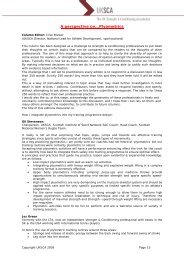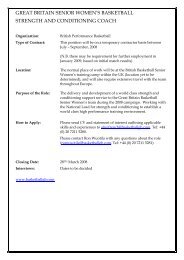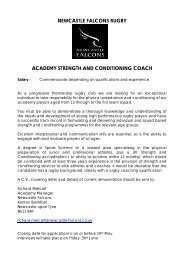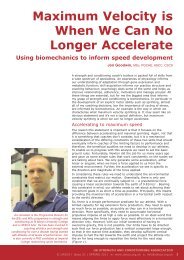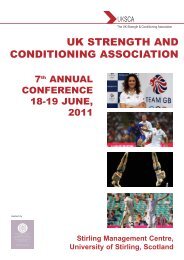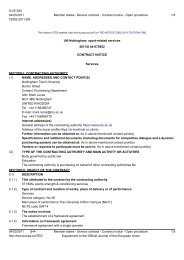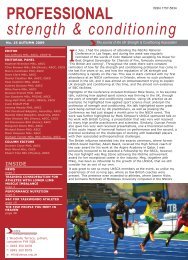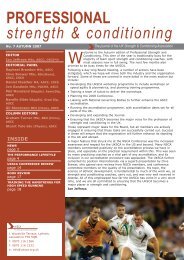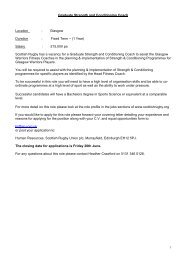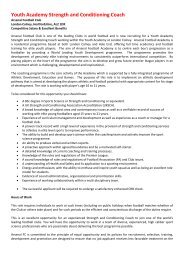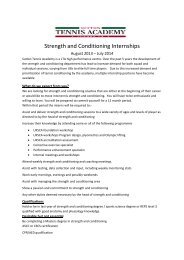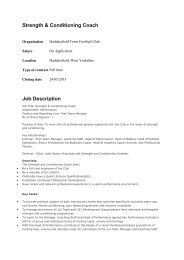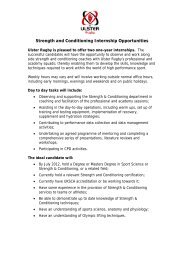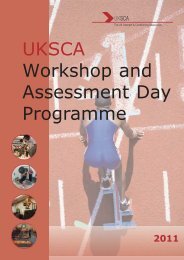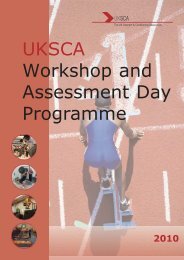uksca news june 2010.qxp
uksca news june 2010.qxp
uksca news june 2010.qxp
Create successful ePaper yourself
Turn your PDF publications into a flip-book with our unique Google optimized e-Paper software.
observe. 14 As British Scientist John Lubbock points out,<br />
“what we see depends on what we look for”, and the<br />
creative mind can provide for the effective germination<br />
of unique solutions to strength and conditioning<br />
challenges. A problem is that, once a brain looks at<br />
something in a certain way, it finds it difficult to see<br />
things from any other perspective. 14 Looking at<br />
something in a different way will require the toleration<br />
of a certain degree of uncertainty, which can be a<br />
challenge for many individuals, but which is essential if<br />
creative ideas are to flourish.<br />
How then does the synthesiser differ from the creator?<br />
The synthesiser’s goal is to place what has already<br />
been established in as useful and illuminating a form<br />
as possible. The creator’s goal is to “extend knowledge,<br />
to ruffle the contours of a genre, to guide a new set of<br />
practices along new and hitherto unanticipated<br />
directions”. 5 The synthesiser seeks order, equilibrium,<br />
closure; the creator is motivated by uncertainty,<br />
surprise, continual challenge and disequilibrium. 5 This<br />
stresses the fact that the five minds should be seen as<br />
complementary, rather than as distinct areas of<br />
competence. Both synthesis and creativity for example<br />
require a baseline of literacy and discipline, however<br />
conversely, too strict an adherence to a disciplinary<br />
track operates against the more open stances of the<br />
synthesiser or creator. 5 While creativity is to be<br />
encouraged, it is important to remember that creativity<br />
is not simply randomly attempting radical solutions,<br />
instead it requires attention to all of the other minds.<br />
The would be creator, has an obligation to be<br />
scrupulous in the completion and validation of work. 5<br />
Albert Einstein once commented, “I am neither<br />
especially clever nor especially gifted. I am only very,<br />
very curious”. This stresses the importance of<br />
questioning and the continual hunt for answers within<br />
all professions. Creativity will always be a chancy<br />
undertaking that can never be guaranteed, only<br />
fostered or thwarted. Cooper 2 suggests that the<br />
greatest learning and achievements come not from<br />
standardised group work but from the unique efforts of<br />
individuals, and coach’s can therefore develop creative<br />
solutions within their own work. This provides an<br />
opportunity for all strength and conditioning coaches to<br />
contribute to the development of the profession<br />
through their own creative activities.<br />
The respectful mind<br />
A classic example of the difference between a strength<br />
and conditioning specialist in an academic environment<br />
and a practicing strength and conditioning coach, is in<br />
the area of planning and periodisation. Undoubtedly,<br />
periodised training plans provide the structure for<br />
effective training programmes, and lie at the heart of<br />
the work of a strength and conditioning coach.<br />
However, while in an academic environment, the plan is<br />
assessed on its own merits; for a coach, plans are<br />
merely a starting point. As John Wooden 16 points out<br />
“the much more difficult task is to create an<br />
environment, a way of thinking, a set of beliefs that<br />
ultimately get everyone working eagerly and to the<br />
best of their ability to make those plans result in a<br />
winning programme”. Most coaches would agree that<br />
the exact same plans will have differing effectiveness in<br />
differing coaching situations. For example, does the<br />
training of the most successful football teams differ<br />
that greatly than those of the not so successful? Or<br />
does it lie in the execution, the way the plan is<br />
presented by the coach, and accepted and adhered to<br />
by the athletes? Here the application of pedagogical<br />
skills for example becomes crucial, but interestingly is<br />
never reported in scientific strength and conditioning<br />
journals where the programme itself is considered the<br />
sole independent variable. In sports it is easy to<br />
become consumed with the X’s and O’s, or in strength<br />
and conditioning on the loads, sets and reps. What is<br />
often harder is the ability to execute these plans in a<br />
manner that delivers consistent success.<br />
The long term success of any programme will depend<br />
upon the coach/athlete interaction and not just the<br />
programme itself. We have all probably worked with<br />
coaches who inspired us to efforts we thought<br />
previously unattainable, but may also have worked<br />
with coaches who didn’t provide the same inspiration.<br />
It is likely that the differences in these situations<br />
reflected a large number of factors, and not simply the<br />
programme itself. The knowledge of the coach cannot<br />
guarantee success. In reports on studies determining<br />
why smart people fail, 9 the greatest problems<br />
professionals have don’t relate to their competencies;<br />
they relate to their relationships. Here, the skills<br />
associated with building effective working relationships<br />
are crucial, and reflect the importance of the respectful<br />
mind. Goleman 6 suggests that in today’s climate,<br />
emotional intelligence is as important as IQ in<br />
determining the most successful individuals. While not<br />
aiming to replace traditional intelligence, emotional<br />
intelligence characteristic such as self awareness, self<br />
regulation, social awareness, and social regulation, can<br />
contribute to the development of effective coaching<br />
relationships, which can contribute to the long term<br />
effectiveness of the strength and conditioning coach.<br />
Strength and Conditioning coaches will, on a day to<br />
day basis, be leading, managing, influencing,<br />
persuading, motivating their programme and the<br />
coaches and athletes working within it. These are all<br />
skills that require mastery of the respectful mind.<br />
Leadership, for example, is a key skill for the coach,<br />
which has at its heart competency in the respectful<br />
mind. Author and management consultant, Peter<br />
Drucker, defines leadership as “the lifting of a man’s<br />
vision to higher sights, the raising of a man’s<br />
performance to a higher standard, the building of a<br />
man’s personality beyond its normal limitations”. 4<br />
Effective leadership lies at the heart of any successful<br />
organisation, as leadership expert John Maxwell 10<br />
asserts, the one thing that all good organisations<br />
possess is good leadership. Superbowl winning Coach<br />
Mike Shanahan 11 emphasises the importance of<br />
leadership, and the transferability of these skills,<br />
stressing that no matter what business you’re in, the<br />
principles of leadership are the same. Yet leadership<br />
skills are not universal, and need to be cultivated and<br />
developed as with any skill. As the Chinese proverb<br />
says, “it is easy to find a thousand soldiers but difficult<br />
to find a good general”. Undoubtedly, coaches assume<br />
positions in which leadership becomes a crucial skill,<br />
yet once again this is an area of expertise which is<br />
rarely covered in the strength and conditioning<br />
literature, and which probably does not presume a high<br />
priority in a strength and conditioning coach’s<br />
professional development plan. Former US President<br />
Harry S.Truman stated that you ”cannot lead others<br />
until you first lead yourself”, and this is only possible if<br />
you invest in yourself, stressing the importance of<br />
professional development, development that needs to<br />
encompass the skills of all 5 minds, rather than simply<br />
on building increasing discipline specific knowledge .<br />
20<br />
UK STRENGTH AND CONDITIONING ASSOCIATION<br />
© UKSCA | Issue 18 | Summer 2010 w: www.<strong>uksca</strong>.org.uk e: info@<strong>uksca</strong>.org.uk



